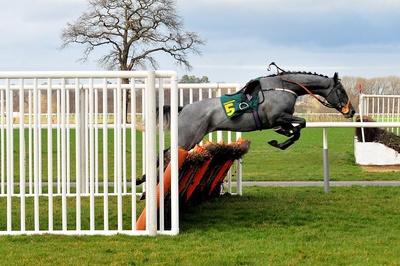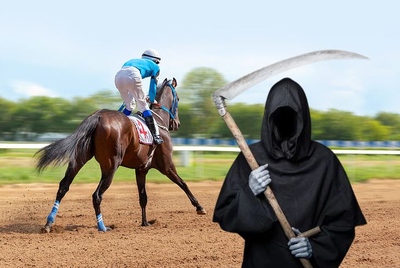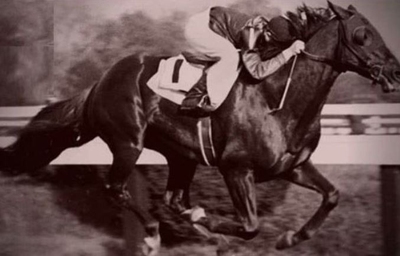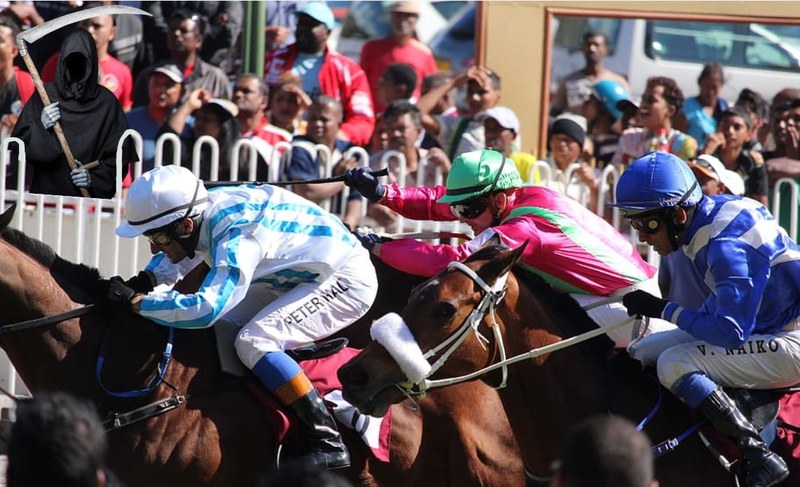When watching a horse that you have backed come home in front, it is vitally important that the jockey is still in the saddle.
Whether vigorously riding out a finish, doffing their cap to the crowd, or waving the whip with wild abandon, as long as the partnership of horse and rider remains intact at the winning line (and the jockey subsequently weighs in with the correct weight) your bet will be paid out.
No Jockey, No Payout

Of course, as racing fans will be all too aware – particularly those of a National Hunt persuasion – horse and jockey don’t always succeed in completing the course together.
Whether via a fall, an unseat, or simply falling out of the saddle, there are numerous ways in which runner and rider can part company during a race. Whenever this occurs, many horses will carry on regardless, running along with the pack and sometimes even managing to cross the line in front.
However, if this situation should occur with one of your bets, marching victoriously towards the payout desk is not advised, as all such runners are, in fact, classed as losers.
The reasoning behind this should be pretty obvious but is related to the “weighing in” and “weighing out” rules, which state that all horses must start and end the race carrying the weight assigned to them by the handicapper.
An absent jockey is, therefore, a fairly glaring breach of the rules.
But What if the Jockey is Dead?
 Those men and women in the saddle certainly lead a perilous existence.
Those men and women in the saddle certainly lead a perilous existence.
By its very nature, hurtling around a racetrack at 40-60 miles per hour aboard a one-tonne animal and – in the case of National Hunt racing – negotiating a series of obstacles, brings with it the prospect of serious injury. However, whilst broken bones, sprains, and bruises are commonplace amongst jockeys, it is thankfully rare that a rider loses their life during a race. Very rare. But tragically, it does occur from time to time, despite the best efforts of the racing authorities to make the sport as safe as reasonably possible.
Whenever a jockey suffers an injury during a race or, on rare occasions, dies, it will almost always be due to a fall.
It is exceedingly uncommon for a seriously injured rider to remain in the saddle and complete a race; and even rarer still that they manage to come home in front in this stricken state. The prospect of a dead jockey going on to win a race is surely impossible.
Or so you would think…
Belmont Park: 4th June 1923
 Predominantly employed as a stable hand, Brooklyn-born Frank Hayes also acted as the stand-in jockey for his yard. It was in 1923 that our doomed hero was called into action to take the ride aboard Sweet Kiss in a Steeplechase at the famous Belmont Park, with the yards’ regular rider otherwise engaged. Keen to seize this short notice opportunity, Hayes set about the unenviable task of shedding 10lbs in the space of 24 hours, in order to make the designated riding weight.
Predominantly employed as a stable hand, Brooklyn-born Frank Hayes also acted as the stand-in jockey for his yard. It was in 1923 that our doomed hero was called into action to take the ride aboard Sweet Kiss in a Steeplechase at the famous Belmont Park, with the yards’ regular rider otherwise engaged. Keen to seize this short notice opportunity, Hayes set about the unenviable task of shedding 10lbs in the space of 24 hours, in order to make the designated riding weight.
All appeared to be going well during the race, as Sweet Kiss and Hayes jumped the last and sauntered up the home straight to land a shock 20/1 victory. A first success for horse and rider, but for both, it would also prove to be their last.
Shortly after the winning line, Hayes tumbled from the saddle, attracting the immediate attention of the on-course doctor, who pronounced him dead at the scene. A heart attack was put forward as the likely cause, but exactly when it occurred during the race will forever remain a mystery. Precisely how much of a role Hayes’ drastic weight loss played in the onset of this unwanted coronary event can only be speculated upon.
The conclusion wasn’t quite so final for Sweet Kiss. Whilst the horse lived on long after Hayes, he never raced again. Sweet Kiss himself may well have been keen to take to the track, but – with his newly gained nickname of “Sweet Kiss of Death” – finding a willing jockey may have proved problematic.
Officially Victorious in Death
Bizarre though the circumstances of his success were, Frank Hayes and Sweet Kiss are listed as the official winners of that fateful chase, with no effort made to alter the records to a living, breathing rider. And in fact, Hayes victory was most likely well within the rules. After all, it would appear that Sweet Kiss did, indeed, carry the correct amount of weight at both the start and finish line – although whether the on-course officials saw fit to cart poor old Hayes off to be weighed in (before being forwarded on to the coroner) – remains unreported.
A Thankfully Unique Result

Over 100 years have passed since Hayes and the Grim Reaper met at Belmont Park, and, mercifully, the situation of a dead jockey coming home in front has never been repeated.
Should such an incident occur in the modern era, it is not entirely clear what the result would be, with no mention of dead jockeys winning races contained within the Official Rules of Racing – as set out by the British Horseracing Authority.
However, with the existing weight-related rules remaining unbroken, it seems likely that should a rider slip this mortal coil during a race but still come home in front, they would at least be granted that one last hurrah and the result would remain unchanged.
But let us hope we never get the chance to find out.
